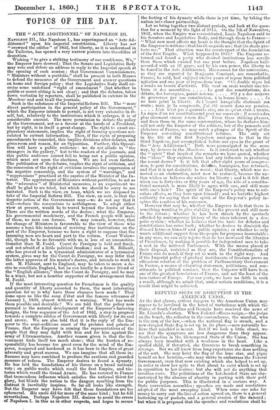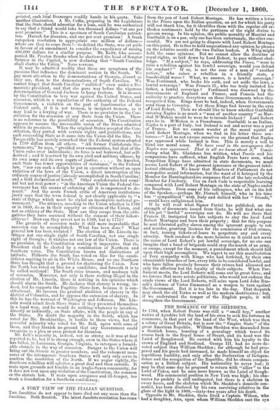REPUTED SIGNS OF DISRUPTION IN THE AMERICAN UNION.
AT the first glance, serious dangers to the American Union may- appear to be involved in the burst of turbulence with which the States of South Carolina and Georgia have received the news of Mr. Lincoln's election. When Federal officers resign,—the judge on the bench, the collector in the customhouse, the marshal, who- is the arm of the law,—when the national flag is struck, and a new-fangled State flag is set up in its place,—men naturally be- lieve that mischief is meant. But if we look a little closer, we see that the symptoms are less dangerous than they appear. South Carolina is the ill-tempered State of the Union. She has. always been troubled with a weakness in the head. Like a spoiled child, if thwarted, she threatens to break something in revenge. But we all know from long experience she does nothing- of the sort. She may hoist the flag of the lone star, and pique- herself on her heroism,—she may strive to embarrass the Federal Government, even that now existing which she helped to set up, in order to show her spite to that about to exist which is set up in opposition to her desires: but she will not do anything that involves costs. The politicians of the hot-headed State are cha- racterized by the absence of alacrity in parting with their gold
for public purposes. This is illustrated in a curious way. A State convention assembles ; speeches are made and resolutions adopted of the most sweeping kind. When some one asks for money to carry out the line of action agreed on, there is a general buttoning up of pockets, and a general evasion of the demand ; but when it is proposed that the speeches and resolutions shall be
printed, each 16cal Boanerges readily hands in his quota. Take another illustration. A Mr. Coffin, proposing in the Legislature that the State should advertise for a loan, said he was authorized to say that a friend would take ten thousand dollars "at one per oent premium." This is a specimen of South Carolinian patriot- ism. Hurrah for disunion, and one per cent premium ! A frank outspoken resolution to appropriate one million of dollars— where are they to come from ?—to defend the State, was E et aside in favour of an amendment to consider the expediency of raising 400,000 dollars for a similar purpose. Mr. Keitt, who accom- panied Mr. Preston Brooks when he shattered the head of Senator Sumner in the Capitol, is now declaring that "South Carolina shall shatter the Union." Nous verrons.
It may be admitted readily that these are symptoms of the passions that influence the dominant section in the South. We pay more attention to the demonstrations of Georgia, absurd as they are, than to the demonstrations of South Carolina. We cannot forget that South Carolina " nullified " even under a De- mocratic president, and that she gave way before the vigorous determination of General Jackson to hang traitors. It is treason by the Constitution to levy war against the United States, and secession, which is a repudiation of the authority of the Federal Government, a violation on the part of functionaries of the Federal oath, if it is not treason, is incipient treason as it may lead to a levying of war. There is no provision in die Con- stitution for the secession of any State from the Union. There is no reference to the possibility of secession. The Constitution appears to assume the irrevocable union of the States admitted within its precincts. When the original States accepted the Con- stitution, they parted with certain rights and jurisdictions, and each succeeding State as it came into the Union did the like. De Tocqueville has acutely remarked that the Federal system adopted in 1789 differs from all others. "All former Confederate Go- vernments," he says, "presided over communities, but that of the Union rules over individuals ; its force is not borrowed, but self- derived ; and it is served by its own civil and military officers, by its own army and its own couts of justice In America, each State has fewer opportunities of resistance," to the Federal law, "nor can such a design be put in execution without an open violation of the laws of the Union, a direct interruption of the ordinary course of justice [already accomplished in South Carolina] and a bold declaration of revolt.' Other confederacies had nomi- nal but not real power ; "in the American Union the Federal Go- vernment has the means of enforcing all it is empowered to de- mand." And the acute French critic of American institutions justly says that the term federal is not clearly applicable to "a state of things which must be styled an incomplete national go- vernment." The citizens, acceding to the Union whether in 1789 or in 1859, do so in their capacity as citizens of the Union, and not as citizens of the State. How can they escape from the obli- gations they have assumed without the consent of their fellow- citizens ? How can they revert not to 1789, but to 1775? The grounds of secession make it still more improbable that secession can be accomplished. What has been done ? What general law has been violated ? The election of Mr. Lincoln in- fringes not one single right of South Carolina, not one single right of Georgia ; it violates not one law of the Union. There is no provision in the Constitution making it imperative that the President shall be elected by a combination of Northern and Southern votes. The Constitution knows not distinctions of latitude. Hitherto the South has voted en bloc for the candi- didates aspiring to sit in the White House, and no one Northern State has thought that a ground for shattering the Union. Now the North has voted en bloc for a candidate, and forsooth it is to be called sectional! The South cries treason, and madmen talk of secession. Moreover, not only is there nothing illegal in the election of Mr. Lincoln, there is nothing in his opinions which should alarm the South. He declares that slavery is wrong, in- deed, but he supports the Fugitive Slave-law, because it is con- stitutional. He favours the gradual abolition of slavery in the district of Columbia, and he opposes the extension of slavery. In this he has the warrant of "Washington and Jefferson. Mr. Lin- coln would admit fresh Slave States if they presented themselves in a legal way, and he would do nothing whatever to interfere, directly or indirectly, on State affairs, with the people in any of the States. No doubt the majority in the South, which has voted for Mr. Breokinridge, is hostile to these views, but the powerful minority who voted for Mr. Bell, agree with some of them, and they furnish no ground that any Government could recognize as a plea or even protest for disunion. Mr. Bell's minority is, indeed, not so strong as it was at first reported to be, but it is strong enough, even in the States where it has failed, in Louisiana, Georgia, Virginia, to interpose a formid- able obstacle in the way of secession. Danger to the Union will bring out its friends in greater numbers, and the vehement mea- sures of the intemperate Southern States will only only serve to confirm the resolution of the North. If we augur rightly, the Southern rebellion will splutter a great deal and then subside. It rests upon grounds not tenable in an Anglo-Saxon community, for it does not rest upon any violation of the Constitution, the common or the statute law. It rests upon arrogance and ill-temper, too weak a foundation for a Southern confederacy.



























 Previous page
Previous page